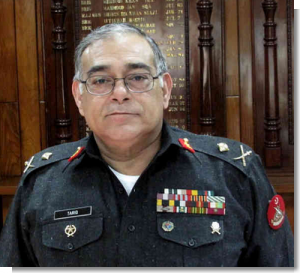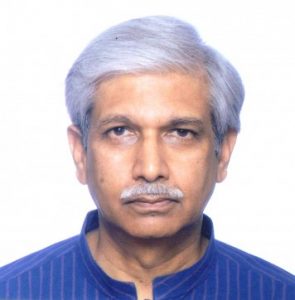To Do or Not To Do?
By Newsline Admin | Cover Story | Published 8 years ago
Brigadier (R) Shaukat Qadir

Brigadier Qadir is a former president of the Islamabad Policy Research Institute
From the outset, I was not favourably inclined towards General (R) Raheel Sharif accepting this assignment and, in our fairly frequent meetings, I stated my views unequivocally.
After giving me a patient hearing in which I outlined my objections and apprehensions, Raheel explained why he was seriously considering the offer.
Both were counter-questions: first, “If such an alliance has to come into being, isn’t it a great honour for a Pakistani to be the first to be asked to assume its command?,” and second, “if so, is there a country among Muslim majority countries better qualified to assume this responsibility?”
I must admit that these questions had me stumped and I could not but accept his line of reasoning. I was opposed to its very inception and creation, but if such an alliance was inevitably on the cards, if it had to happen, being offered the first command is indeed an honour.
And, indeed if it was inevitable, no other country among the Muslim majority countries was better qualified than Pakistan. Our military is a force of veterans experienced in the war on terror, battle-hardened and well trained.
As Pakistan’s former army chief, Raheel had acquired a stature that was internationally recognised and respected. His assumption of command would automatically reflect favourably on this venture.
The fact that both, the US and China, were so pleased with his appointment, bears testimony to that fact.
Other concerns that we discussed included the exclusively Sunni composition. Raheel shared my concerns but, based on his discussions with the Saudis, felt confident of his ability to address these concerns from within.
His clinching argument was that the Constitution of this alliance was in the process of being drafted and would be passed only when he approved the draft.
As far as I was concerned, that clinched the matter. The question of whether the government should have given him an NOC or not, would be better addressed by a constitutional expert than a former soldier.
On the face of it, PTI’s stance on the appointment makes sense. The parliament unanimously rejected the Saudi request for assistance in Yemen. But, Raheel’s appointment has been in the offing since well before he retired. I don’t recall any objections of this kind being made earlier. Nor was Raheel’s assumption of this office ever linked with the greater ongoing conflict in the Middle East. Both the linkage and the ‘principled’ objection seem to be an afterthought.
And, if the objection is to sending troops now, we are told that these troops are meant exclusively for the defence of holy places — a task that has never been turned down. But, if there is still an objection, should it not be the government’s responsibility to answer and not that of an army chief, sitting or retired?
Finally, Defence Minister Khawaja Asif’s antics in “reporting” to the National Assembly that Raheel [was guilty] of not having sought an NOC, as I clarified earlier, the fact that an NOC was guaranteed to him the day the assignment was offered, was never in doubt.
Lt General (R) Tariq Khan

Lt Genl Tariq Khan was the Commander of 1 Strike Corps at mangle from 2010 till 2014
General Raheel Sharif has been given an NOC by the government, which allows him to accept the job offer by the Saudis. However, what is not clear is whether his acceptance is on behalf of the government and the country, or a personal matter. If it is the former, then it contradicts Parliament’s resolution, whereby it was amply demonstrated that we were not to be part of the Saudi Coalition. If it is the latter, then though personal, it begs the question: will it have implications for Pakistan in general and the army in particular? Whatever the case, the coalition is at best an idea at the moment and clarifications are needed:
- Is the Headquarters, where General Raheel goes, going to be a force-generating Headquarters, or will it have a standing army?
- If it is going to have a standing army, what will the force levels be, and where will they be located? Will such a force be co-located in neighbouring countries, or will all of it be in Saudi Arabia?
- Will this include the navy and
airforce, specialised forces, logistic elements, etc? - What are the purpose, objectives and area of responsibility of such a force?
- What would the sectarian structure of this force be, and which sects would be recruited?
- Will Iran be part of the coalition?
- Even if General Raheel is the commander of such a force by personal choice, will it have any pull on our resources in terms of men and material?
- What happens if the force is to be employed against a country or an event which is not in keeping with Pakistan’s national interests?
- And what is the proposed or allocated budget for this enterprise?
So, as far the good General is concerned, he, in his personal capacity, is free to go where he wishes to, though the propriety of such an appointment will raise questions. However, clarity in the process must be forthcoming. Our government appears to be in indecent haste in fulfilling the Saudi demand, while appearing indifferent towards its own Parliament. This, in itself, is a contradiction that needs to be explained. What has the government gained, and what has the country got in return? Where lies the compromise, if any?
We need answers.
Air Vice Marshal (R) Shahzad Chaudhry

Air Vice Marshal Chaudhry is a political and security analyst
General Raheel Sharif’s placement at the head of the 39-nation coalition force is a done deal. The spokesman at the Foreign Office has acknowledged that the government has agreed to become part of the force. Which countries the force will comprise of, and in what numbers, remains a big question mark at the moment. Of the 57 Muslim nations in the world, 18 are not yet a part of the alliance, of which Iraq, Iran and Syria stand out as notable absentees. This projects its own dynamics as the force is liable to be considered a Sunni force only, and not an Islamic coalition against the common threat of terrorism. Moreover, it can create its own complexities in the domain of foreign policy.
The government of the day may have used the opportunity to repair some of the damage caused when public opinion in Pakistan, as well as its parliament, both reacted in the negative to the Saudi invitation to join the coalition force against the ongoing war in Yemen. It was a courageous decision then, to place Pakistan’s interests before those of another nation, despite the fraternal ties that have existed between the two. The decision to now join another coalition under the Saudi leadership, without clear objectives and without a transparent plan of likely employment, will only mean that, as a nation, we have let expedience dictate our decisions again. It may have saved the day for personal and familial relations between the House of Sharif and the House of Saud, but Pakistani national interests stand clearly relegated to the sidelines.
One possible complication can arise from the typical Sunni-Wahabi disposition under which the force will function. If, at a certain time, a political decision in Riyadh employs the force under General Sharif, with Pakistani participation, in an area likely to be contentious given the mutual acrimony between Saudi Arabia and Iran, the impact of this on the bilateral relations between Iran and Pakistan will remain a moot point and of considerable concern. The general may only be the titular head, with employment control expressly in Saudi hands, forcing a situation that may test Pakistan’s already tenuous bilateral relations with regional nations.
The declared purpose of the force, to fight a common threat — terrorism — is a convenient sell, but seems impractical any which way. Terrorism is a local phenomenon, which needs to be fought at the respective level of the state, only by troops and intelligence functions which reside in a typical strategic environment of a particular terrain. Hardly ever is an international force summoned to fight terror unless it converts into an insurgency, and local forces alone respond to the event in a time-restricted domain. Thus, it does not yet square up, but it may do so after the force evolves, if at all, and its structure, role and functions are spelt out clearly.
Whether General Raheel Sharif should have chosen to take the assignment is a matter of personal choice outside the domain of other people’s opinions. However, what is of critical concern is that an already-vulnerable Pakistan may have exposed itself to future risks in the management of its foreign policy.
Lt Colonel (R) Muhammad Ali Ehsan

Lt Colonel Muhammad Ali is Phd in civil-military relations
General (R) Raheel Sharif has finally been allowed by the government to head the Saudi-led, ‘NATO-like’ 39-member Muslim nations’ military alliance. The alliance, it is being said, “will combat terrorism and emerging threats like IS.” We know that General Raheel did a fine job leading his own army in the war against terrorism, but would he be able to perform an equally good job leading this military alliance of 39 Muslims nations?
The Middle East has a history. Terrorism breeds there not because the states lack the military capabilities to deploy against it, or because the leadership has been less assertive — in fact, it is the interference by powers from outside that has prevented the deep-rooted problems in the Middle East from being solved. The four ongoing full-blown civil wars (Iraq, Libya, Syria and Yemen) are prime examples of such interference and any military alliance (be it of Muslim nations or otherwise) that thinks it can become a ‘regional stabiliser’ by ignoring and circumventing around these civil wars to challenge IS, or remove terrorism from the region, is largely mistaken.
To fight terrorism or to fight IS, the Saudi-led military alliance will not only have to eliminate these civil wars, but, in doing so, also prevent the spillover of these civil wars in the neighbouring countries, such as Turkey, Egypt, South Sudan, Algeria, Jordan, Lebanon, Tunisia and Saudi Arabia. Put simply, this Saudi-led ‘Muslim military alliance’ will have to put military boots on the ground to bring stability to the region. Pakistan, as is now apparent, has shown its willingness to readily export its retired general to head the grand alliance, but will it now show equal readiness to export its troops as well to become part of the alliance? Even if Pakistan does not contribute any troops to the alliance, can any general command a military alliance of 39 nations without his own country and military contributing troops to it? (Pakistan’s Parliament has already disapproved the joining of this alliance).
Considering that most of the roles that this Saudi-led military alliance will be performing will have nothing to do directly with Pakistan’s security, would it be wise to risk entrapping our troops in this unwanted and unnecessary ‘fourth-front war?’ We are already fighting a war on our eastern and western fronts, with the internal war against a host of miscreants and militants constituting our third front.
Another important question that needs to be addressed is that if this Pan-Islamic alliance is to replace NATO as the dominant security organisation in the Middle East, how is it going to treat one of the US’ greatest interests in the region — Israel? The safety of Israel is most important to Americans, whereas the strong military alliance of Muslim countries will eventually be seen as not only a counterbalance to IS and terrorism, but to Israel as well. This alliance may not be walking into a power vacuum; in fact it may just create another power-rivalry in the region. Thus, no matter how militarily powerful IMAFT becomes, NATO will remain the dominant security organisation in the Middle East (always ready to challenge those threatening US and Israeli interests).
In short, in today’s high-tech battlefield environment, counter-terrorism operations are being executed through drone strikes, aerial strikes, with precision-guided munitions, or raids by special forces. The outside powers that have militarily intervened in the Middle East, including NATO, USA and Russia, all have these military capabilities, yet the Middle East has remained destabilised and the civil wars have continued. Besides, there are Muslim countries that have not, so far, been invited to join the alliance. Indonesia and Malaysia are two countries that have stayed away despite being invited. Perhaps they don’t want to invite a blowback by being the blinking blips on the IS radar. Will such participation not unnecessarily place Pakistan on IS’ ‘bull’s eye’ and ‘cross hairs’ too?
Pakistan may commit as many retired generals as it wishes to any global and regional military alliances, but it is our troops that we must not commit — not when we have a lot of security threats that need fixing at home. The state must first, ably and efficiently, guard its own national interests and its own frontiers before it reaches out and does the same outside. As far as General (R) Raheel Sharif is concerned, the experience for him may be personally rewarding, but without his own country contributing troops to the alliance, it will not be business as usual.


